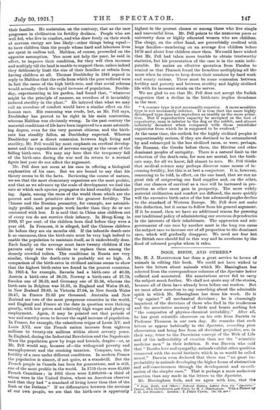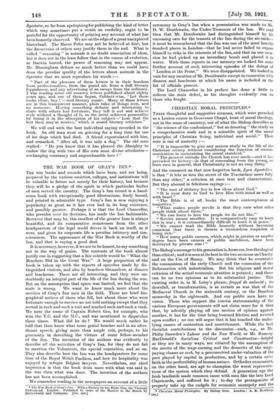DOGS, BIRDS, AND OTHERS.*
Mn. H. J. Rostra:num has done a great service to lovers of animals in editing this book. We could not have wished to have the letters about animals which Mr. Massingham has selected from the correspondence columns of the Spectator better collated and annotated. His annotations never fail to carry the subject much further. We shall not quote any of the stories, because all of them have already been before our readers. But we must allow ourselves to say something about tho admirable spirit in which Mr. Massingham has done his work. He is "up against" all mechanical doctrines ; he is charmingly impatient of the doctrines of those who find in tho tenderness and the associative memory of birds and beasts nothing but "the composites of physico-chemical irritability." After all, he has great scientific observers on his side from Darwin to Professor Thomson in our own day. He remarks that such letters as appear habitually in the Speckdor, recording pure observation and being free from all doctrinal prejudice, are, in their way, truer to the Darwinian concept of the Web of Life and of the indivisibility of creation than are the "scientific medicine men" in their isolation. It was Darwin who said that "Besides love and sympathy, animals exhibit other qualities connected with the social instincts which in us would be called moral." Darwin even declared that there was "no great im- probability in animals developing the higher forms of abstraction and self-consciousness through the development and co-ordi- nation of the simpler ones." That is perhaps a more audacious assertion than any made in the letters to the Spectator.
Mr. Massingham feels, and we agree with him, that the
• Dogs, Birds, and Others : Natural History Letters from Ma "=r•.' Chosen, with Introduction and Notes by H. J. Haaaingham. With a bf J. St. Los Strachey. London : T. Fisher Unwin. 18a. Gd. net-1
Spectator, so far from apologizing for publishing the kind of letter which may sometimes put a strain en credulity, ought to be grateful for the opportunity of printing any account of what has been honestly observed. We are on the edge of a great unexplored hinterland. The Marco Poles may not be believed at first, but the discoveries of others may justify them in the end. What is called " reasoning " in animals is no doubt association.of ideas, but it does not in the least follow that in the course of evolution, as Darwin hinted, the power of reasoning may not appear. Mr. Massingham defines so much better than we could have done the peculiar quality of the letters about animals in the Spectator that we must reproduce his words :—
" Part of the pleasure of these letters is in their freedom from professionalism, from the grand air, from a dull literary foppishness, and any advertising of an escape from the ordinary. I was reading some old country letters published about eighty years ago, and one of them began, Cobbett-wise, 'Let those rooks alone, boy ! '—real literary music. Many of these letters are in this transparent manner, plain tales of things seen, and no nonsense. Having something definite and interesting to share with others less fortunate, they tell it out and achieve style without a thought of it, as the artist achieves personality by losing it in the absorption of his subject—' Lose that the lost thou may'st receive,' which is sound literary criticism."
We will end with the best individual saying recorded in the book. An old man went on grieving for a long time for one of his dogs which had died. A friend expostulated with him, and remarked, "After all, it was only a dog." The old man replied • "Do you know that it has pleased the Almighty to endow the dog with two of His own most divine attributes— unchanging constancy and unpurchasable love ? "



































 Previous page
Previous page